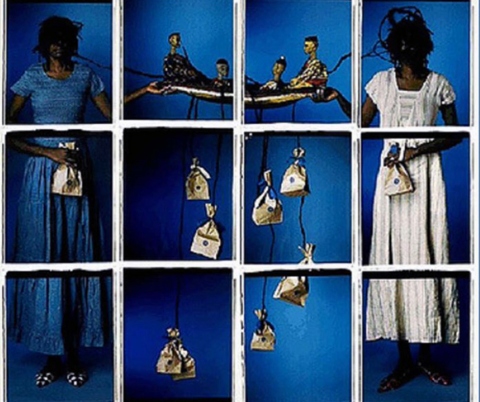Representing Migration through Digital Humanities (2019-2020)
Human migration is difficult to represent. Its inherent transience often renders its memory ephemeral.
Digital humanities tools are now being used to creatively visualize human migration. The digitization of archival databases as well as digital mapping tools, timelines and storytelling applications make it possible to visualize and interact with data and stories in exciting ways and can open new conversations about the people, places and politics that are central to the long histories of human movement across the planet.
This project team extended the work of Duke’s Representing Migration Humanities Lab and built on a Data+ summer project through two linked projects: Remembering the Middle Passage and Linguistic Landscapes.
The Remembering the Middle Passage team brought together faculty, librarians, graduate and undergraduate students from five disciplines and three institutions to ask the question: How can we use digital tools to represent, and ultimately memorialize, the enslaved Africans who died during the Middle Passage? In response, team members read and discussed primary and secondary literature and investigated ship logbooks to find the dates and times of deaths of enslaved persons along the Middle Passage.
The team then developed a virtual map of where the deaths of enslaved persons occurred in the Atlantic from approximately 1750-1850 using ArcGIS StoryMaps. Team members also collaboratively wrote an Acknowledgements document in order to examine the ethics of their project and acknowledge their commitment to the lives of those lost in the Middle Passage.
Doctoral students Isabel Bradley (Romance Studies), Kelsey Desir (English), Jane Harwell (English), Tye Landels-Gruenewald (English), Anya Lewis-Meeks (English) and Perry Sweitzer (Religion) received a Bass Connections Student Research Award to expand on the team’s research by further examining archival material to improve the digital map, open their research to the community through a public conference, focus groups and activist workshops, and develop teaching materials for primary and secondary schools.
The Linguistic Landscapes team created an interactive map of the Triangle area, starting with Durham, to capture locations and distribution of multilingual signs on store signboards and shop fronts, billboards, notices, posters, advertisements, LED and neon signs. This project built on the growing body of work in the field of linguistic landscapes, which focuses on visual representations of language in urban spaces.
Timing
Fall 2019 – Spring 2020
Team Outputs
“Died a small boy”: Re-Centering the Human in Geospatial Data from the Middle Passage. Tye Landels, Isabel Bradley, Kelsey Desir, Grant Glass, Jane Harwell, Anya Lewis Meeks, Charlotte Sussman. 2023. Archipelagos: A Journal of Carribbean Digital Praxis.
Remember the Middle Passage. (Team website) Dominika Baran, Charlotte Sussman, Andrew Keener, Elizabeth Milewicz, Isabel Bradley, Kelsey Desir, Jane Harwell, Tye Landels, Anya Lewis-Meeks, J. Perry Sweitzer, Alexander Frumkin, Mikaela Johnson, Shalin Kapil, Lily Koning, Cayley Ryan, Grant Glass, Xiaoou (Daisy) Zhan. 2020.
Remembering the Middle Passage (Fortin Foundation Bass Connections Virtual Showcase 2020)
Linguistic Landscapes of Durham (presentation by Shalin Kapil, Lily Koning, Cayley Ryan; Representing Migration Humanities Lab Works-in-Progress Showcase, Duke University, January 31, 2020)
Remembering the Middle Passage (presentation by Isabel Bradley, Kelsey Desir, Grant Glass, Jane Harwell, Tye Landels, Anya Lewis-Meeks, Perry Sweitzer; Representing Migration Humanities Lab Works-in-Progress Showcase, Duke University, January 31, 2020)
Representing Migration through Digital Humanities (presentation by Charlotte Sussman, Jane Harwell, Perry Sweitzer, Daisy Zhan, Dominika Baran; John Hope Franklin Center for Interdisciplinary and International Studies, Duke University, December 4, 2019)
Commemorations and Reparations: Slavery's Global Legacies and Local Contexts (Virtual conference January 29-30, 2021)
This Team in the News
Interdisciplinary Researchers Discuss Faculty-Student Research
Research Methods and Creative Outputs from Interdisciplinary Teams
Hidden in Plain Sight: The Growing Role of Computation in Science
The Race to Create a Seabed Memorial to Slave Trade Victims
Drexciya: How Afrofuturism Is Inspiring Calls for an Ocean Memorial to Slavery
Bass Connections Teams Share Research Highlights in a Virtual Showcase
Meet the Winners of the 2020 Bass Connections Student Research Awards
How Do We Remember and Memorialize the Middle Passage?
Migration’s Many Forms: Finding Creative Ways to Examine the Movement of Populations
See related Data+ summer project, Remembering the Middle Passage (2019).
Image from Remembering the Middle Passage course listing shared by BlueDevilHumanities

Team Leaders
- Dominika Baran, Arts & Sciences-English
- Charlotte Sussman, Arts & Sciences-English
/graduate Team Members
-
Isabel Bradley, Romance Studies-AM, Romance Studies-PHD
-
Kelsey Desir, English-PHD
-
Jane Harwell, English-PHD
-
Tye Landels, English-PHD
-
Anya Lewis-Meeks, English-PHD
-
J. Perry Sweitzer, Religion-PHD
/undergraduate Team Members
-
Alexander Frumkin, Political Science (AB)
-
Mikaela Johnson, English (AB), Religion (AB2)
-
Shalin Kapil, Linguistics (AB)
-
Lily Koning, Int Comparative Studies (AB)
-
Cayley Ryan, Linguistics (AB)
/yfaculty/staff Team Members
-
Grant Glass, PhD Student, UNC-Chapel Hill (English & Comparative Literature)
-
Andrew Keener, Duke Libraries
-
Elizabeth Milewicz, Duke Libraries
/zcommunity Team Members
-
Xiaoou (Daisy) Zhan, Undergraduate Student, Haverford College
